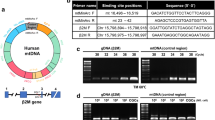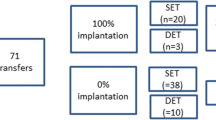Abstract
Purpose
Low mitochondrial DNA (mtDNA) content in oocytes and in cumulus cells is an indicator of poor oocyte quality. Moreover, initial evidence showed a correlation between mtDNA content in cumulus cells and mtDNA copy number in peripheral blood cells. On these bases, we deemed of interest investigating the correlation between mtDNA copy number in peripheral blood and natural fecundity.
Methods
This is a nested case–control study drawn from a prospective cohort of pregnant women referred for routine first trimester screening for aneuploidies (from 11 + 0 to 12 + 6 weeks of gestation) between January 2012 and March 2013 at the “Fondazione IRCCS Ca’ Granda Ospedale Maggiore Policlinico” of Milan, Italy. Cases were subfertile women who attempted to become pregnant for 12–24 months. Controls were the two subsequently age-matched women who became pregnant in less than 1 year. MtDNA was quantified using real-time PCR and normalized to nuclear DNA.
Results
One hundred and four subfertile women and 208 controls were selected. The median (IQR) mtDNA copy number was 95 (73–124) and 145 (106–198), respectively (p < 0.001). The area under the ROC curve was 0.73 (95% CI 0.67–0.79) (p < 0.001). The Youden index was 105 mtDNA copy number. The crude OR for subfertility in women with mtDNA copy number below this threshold was 5.72 (95% CI 3.43–9.55). The accuracy of mtDNA copy number assessment in peripheral blood progressively decreased with increasing female age.
Conclusions
Low mtDNA copy number in peripheral blood is associated with an increased risk of subfertility and may represent a biomarker of natural fecundity.


Similar content being viewed by others
References
Shen J, Gopalakrishnan V, Lee J, Fang S, Zhao H. Mitochondrial DNA copy number in peripheral blood and melanoma risk. PLoS One. 2015;10:e0131649.
Zhang J, Xu S, Xu Y, Liu Y, Li Z, Zhang Y, et al. Relation of mitochondrial DNA copy number in peripheral blood to postoperative atrial fibrillation after isolated off-pump coronary artery bypass grafting. Am J Cardiol. 2017;119:473–7.
Demain LA, Conway GS, Newman WG. Genetics of mitochondrial dysfunction and infertility. Clin Genet. 2017;91:199–207.
May-Panloup P, Boucret L, de la Chao Barca JM, Desquiret-Dumas V, Ferré-L’Hotellier V, Morinière C, et al. Ovarian ageing: the role of mitochondria in oocytes and follicles. Hum Reprod Update. 2016;22:725–43.
Aiken CE, Tarry-Adkins JL, Penfold NC, Dearden L, Ozanne SE. Decreased ovarian reserve, dysregulation of mitochondrial biogenesis, and increased lipid peroxidation in female mouse offspring exposed to an obesogenic maternal diet. FASEB J. 2015;30:1548–56.
Ratts VS, Flaws JA, Kolp R, Sorenson CM, Tilly JL. Ablation of bcl-2 gene expression decreases the numbers of oocytes and primordial follicles established in the post-natal female mouse gonad. Endocrinology. 1995;136:3665–8.
Hsu SY, Lai RJ, Finegold M, Hsueh AJ. Targeted overexpression of Bcl-2 in ovaries of transgenic mice leads to decreased follicle apoptosis, enhanced folliculogenesis, and increased germ cell tumorigenesis. Endocrinology. 1996;137:4837–43.
Chipuk JE, Moldoveanu T, Llambi F, Parsons MJ, Green DR. The BCL-2 family reunion. Mol Cell. 2010;37:299–310.
Bonomi M, Somigliana E, Cacciatore C, Busnelli M, Rossetti R, Bonetti S, et al. Blood cell mitochondrial DNA content and premature ovarian aging. PLoS One. 2012;7:e42423.
Ene AC, Park S, Edelmann W, Taketo T. Caspase 9 is constitutively activated in mouse oocytes and plays a key role in oocyte elimination during meiotic prophase progression. Dev Biol. 2013;377:213–23.
St John JC, Tsai TS, Cagnone GL. Mitochondrial DNA supplementation as an enhancer of female reproductive capacity. Curr Opin Obstet Gynecol. 2016;28:211–6.
St John JC. Mitochondrial DNA copy number and replication in reprogramming and differentiation. Semin Cell Dev Biol. 2016;52:93–101.
Santos TA, El Shourbagy S, St John JC. Mitochondrial content reflects oocyte variability and fertilization outcome. Fertil Steril. 2006;85:584–91.
Reynier P, May-Panloup P, Chretien MF, Morgan CJ, Jean M, Savagner F. Mitochondrial DNA content affects the fertilizability of human oocytes. Mol Hum Reprod. 2001;7:425–9.
Babayev E, Seli E. Oocyte mitochondrial function and reproduction. Curr Opin Obstet Gynecol. 2015;27:175–81.
St John J. The control of mtDNA replication during differentiation and development. Biochim Biophys Acta. 1840;2014:1345–54.
Boucret L, de la Chao Barca JM, Moriniere C, Desquiret V, Ferre-L’Hotellier V, Descamps P. Relationship between diminished ovarian reserve and mitochondrial biogenesis in cumulus cells. Hum Reprod. 2015;30:1653–64.
Ogino M, Tsubamoto H, Sakata K, Oohama N, Hayakawa H, Kojima T. Mitochondrial DNA copy number in cumulus cells is a strong predictor of obtaining good-quality embryos after IVF. J Assist Reprod Genet. 2016;33:367–71.
Desquiret-Dumas V, Clément A, Seegers V, Boucret L, Ferré-L'Hotellier V, Bouet PE, et al. The mitochondrial DNA content of cumulus granulosa cells is linked to embryo quality. Hum Reprod. 2017;32:607–14.
Colleoni F, Lattuada D, Garretto A, Massari M, Mandò C, Somigliana E, et al. Maternal blood mitochondrial DNA content during normal and intrauterine growth restricted (IUGR) pregnancy. Am J Obstet Gynecol. 2010;203:365.e1–6.
Unal I. Defining an optimal cut-point value in ROC analysis: an alternative approach. Comput Math Methods Med. 2017;3762651
Luoma P, Melberg A, Rinne JO, Kaukonen JA, Nupponen NN, Chalmers RM, et al. Parkinsonism, premature menopause, and mitochondrial DNA polymerase gamma mutations: clinical and molecular genetic study. Lancet. 2004;364:875–82.
Steiner AZ, Herring AH, Kesner JS, Meadows JW, Stanczyk FZ, Hoberman S, Baird DD Antimüllerian hormone as a predictor of natural fecundability in women aged 30–42 years. Obstet Gynecol 2011;117:798–804.
Streuli I, de Mouzon J, Paccolat C, Chapron C, Petignat P, Irion OP, et al. AMH concentration is not related to effective time to pregnancy in women who conceive naturally. Reprod BioMed Online. 2014;28:216–24.
Hagen CP, Vestergaard S, Juul A, Skakkebæk NE, Andersson AM, Main KM, et al. Low concentration of circulating antimüllerian hormone is not predictive of reduced fecundability in young healthy women: a prospective cohort study. Fertil Steril. 2012;98:–1602–8.e2.
Somigliana E, Lattuada D, Colciaghi B, Filippi F, La Vecchia I, Tirelli A, et al. Serum anti-Müllerian hormone in subfertile women. Acta Obstet Gynecol Scan. 2015;94:1307–12.
Steiner AZ, Pritchard D, Stanczyk FZ, Kesner JS, Meadows JW, Herring AH, et al. Association between biomarkers of ovarian reserve and infertility among older women of reproductive age. JAMA. 2017;318:1367–76.
Hsiao CP, Hoppel C. Analyzing mitochondrial function in human peripheral blood mononuclear cells. Anal Biochem. 2018;549:12–20.
Knez J, Marrachelli VG, Cauwenberghs N, Winckelmans E, Zhang Z, Thijs L, et al. Peripheral blood mitochondrial DNA content in relation to circulating metabolites and inflammatory markers: a population study. PLoS One. 2017;12:e0181036.
Ballinger SW, Patterson C, Knight-Lozano CA, Burow DL, Conklin CA, Hu Z, et al. Mitochondrial integrity and function in atherogenesis. Circulation. 2002;106:544–9.
Yakes F, Van Houten B. Mitochondrial DNA damage is more extensive and persists longer than nuclear DNA damage in human cells following oxidative stress. Proc Natl Acad Sci USA. 1997;94:514–9.
Liu LP, Cheng K, Ning MA, Li HH, Wang HC, Li F, et al. Association between peripheral blood cells mitochondrial DNA content and severity of coronary heart disease. Atherosclerosis. 2017;261:105–10.
Ashar FN, Zhang Y, Longchamps RJ, Lane J, Moes A, Grove ML, et al. Association of mitochondrial DNA copy number with cardiovascular disease. JAMA Cardiol. 2017;2(11):1247–55.
Kim JY, Choi JR, Park IH, Huh JH, Son JW, Kim KW, et al. A prospective study of leucocyte mitochondrial DNA content and deletion in association with the metabolic syndrome. Diabetes Metab. 2017;43(3):280–3.
Révész D, Verhoeven JE, Picard M, Lin J, Sidney S, Epel ES, et al. Associations between cellular aging markers and metabolic syndrome: findings from the CARDIA study. J Clin Endocrinol Metab. 2018;103(1):148–57.
Huang CH, Su SL, Hsieh MC, Cheng WL, Chang CC, Wu HL, et al. Depleted leukocyte mitochondrial DNA copy number in metabolic syndrome. J Atheroscler Thromb. 2011;18(10):867–73.
Knez J, Winckelmans E, Plusquin M, Thijs L, Cauwenberghs N, Gu Y, et al. Correlates of peripheral blood mitochondrial DNA content in a general population. Am J Epidemiol. 2016;183:138–46.
Wong J, McLennan SV, Molyneaux L, Min D, Twigg SM, Yue DK. Mitochondrial DNA content in peripheral blood monocytes: relationship with age of diabetes onset and diabetic complications. Diabetologia. 2009;52:1953–61.
Somigliana E, Paffoni A, Busnelli A, Filippi F, Pagliardini L, Vigano P, et al. Age-related infertility and unexplained infertility: an intricate clinical dilemma. Hum Reprod. 2016;31:1390–6.
Mengel-From J, Thinggaard M, Dalgård C, Kyvik KO, Christensen K, Christiansen L. Mitochondrial DNA copy number in peripheral blood cells declines with age and is associated with general health among elderly. Hum Genet. 2014;133:1149–59.
Toledo FG, Watkins S, Kelley DE. Changes induced by physical activity and weight loss in the morphology of intermyofibrillar mitochondria in obese men and women. J Clin Endocrinol Metab. 2006;91:3224–7.
Chavarro JE, Rich-Edwards JW, Rosner BA, Willett WC. Diet and lifestyle in the prevention of ovulatory disorder infertility. Obstet Gynecol. 2007;110:1050–8.
Ravichandran K, McCaffrey C, Grifo J, Morales A, Perloe M, Munne S, et al. Mitochondrial DNA quantification as a tool for embryo viability assessment: retrospective analysis of data from single euploid blastocyst transfers. Hum Reprod. 2017;32:1282–92.
Wells D, Ravichandran K, McCaffrey C, Grifo J, Morales A, Perloe M, et al. Reply: mitochondrial DNA quantification-the devil in the detail. Hum Reprod. 2017;32:2150–1.
Barnes FL, Victor AR, Zouves CG, Viotti M. Mitochondrial DNA quantitation-making sense of contradictory reports. Hum Reprod. 2017;32:2149–50.
Wang T, Zhang M, Jiang Z, Seli E. Mitochondrial dysfunction and ovarian aging. Am J Reprod Immunol. 2017;77(5).
Fragouli E, Spath K, Alfarawati S, Kaper F, Craig A, Michel CE, et al. Altered levels of mitochondrial DNA are associated with female age, aneuploidy, and provide an independent measure of embryonic implantation potential. PLoS Genet. 2015;11:e1005241.
Baird DD, Wilcox AJ, Weinberg CR. Use of time to pregnancy to study environmental exposures. Am J Epidemiol. 1986;124:470–80.
Te Velde ER, Eijkemans R, Habbema HD. Variation in couple fecundity and time to pregnancy, an essential concept in human reproduction. Lancet. 2000;355:1928–9.
Joffe M. Time trends in biological fertility in Britain. Lancet. 2000;355:1961–5.
Vélez MP, Arbuckle TE, Fraser WD. Female exposure to phenols and phthalates and time to pregnancy: the maternal-infant research on environmental chemicals (MIREC) study. Fertil Steril. 2015;103:1011–20.
Buck Louis GM, Sundaram R, Schisterman EF, Sweeney A, Lynch CD, Kim S, et al. Semen quality and time to pregnancy: the longitudinal investigation of fertility and the environment study. Fertil Steril. 2014;101:453–62.
Lin XJ, Chong Y, Guo ZW, Xie C, Yang XJ, Zhang Q, et al. A serum microRNA classifier for early detection of hepatocellular carcinoma: a multicentre, retrospective, longitudinal biomarker identification study with a nested case-control study. Lancet Oncol. 2015;16:804–15.
Author information
Authors and Affiliations
Corresponding author
Ethics declarations
The study was accepted by the local Institutional Review Board. All recruited patients provided a written informed consent to participate.
Conflict of interest
A.B., D.L., R.R., A.P., L.P., L.F., and E.S., according to Italian laws, filed a patent application for mitochondrial DNA quantification in peripheral blood and for its use as non-invasive biomarker for female subfertility. E.S. handled grants of research from Ferring and Merck-Serono.
Additional information
Andrea Busnelli and Debora Lattuada should be regarded as joint first authors.
Rights and permissions
About this article
Cite this article
Busnelli, A., Lattuada, D., Rossetti, R. et al. Mitochondrial DNA copy number in peripheral blood: a potential non-invasive biomarker for female subfertility. J Assist Reprod Genet 35, 1987–1994 (2018). https://doi.org/10.1007/s10815-018-1291-5
Received:
Accepted:
Published:
Issue Date:
DOI: https://doi.org/10.1007/s10815-018-1291-5




